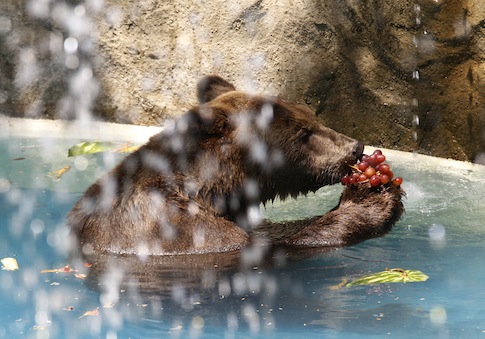The U.S. Department of Agriculture is considering adopting new regulations for zoos at the request of People for the Ethical Treatment of Animals (PETA) that would require "humane" treatment for bears.
The proposed rules would mandate the Animal and Plant Health Inspection Service (APHIS) to hire a "bear expert," prohibit bear pits, and require rules so bears are not "stressed, frustrated, and bored."
PETA, which killed 1,792 cats and dogs as a shelter of last resort in 2013, first petitioned the USDA to adopt its rules in 2012. The agency began accepting comments on its petition last November, and extended the comment period on Monday.
The 64-page petition calls for new regulations that would require zoos to provide "privacy" for bears. Throughout the document, the animal rights group voices concern that zoo bears are "stressed, frustrated, and bored."
"It has been widely noted in the scientific literature that bears’ instinctive curiosity, great strength and dexterity, and capacity for rooting about, exploring, and destroying, require that they receive more specialized care than many other species in captivity," the petition said.
"When confined in enclosures without room to dig, forage, and engage in other bear-specific behaviors, bears quickly become stressed, frustrated, and bored," it said.
PETA has proposed a variety of regulations, including allowing "the bears to regulate their own activity levels, temperature, and visibility to the public."
PETA argues existing regulations under the Animal Welfare Act (AWA), which already require standards for ventilation, lighting, shelter, feeding, and training of employees, are inadequate.
"[T]he AWA currently has no provision for environmental enrichment for bears," PETA said.
"Consistent with the current scientific knowledge, captive bears must—at a minimum—have appropriate shelter, and opportunities to forage, climb, explore, dig, cool themselves or bathe in a pool, and seek privacy," the petition said.
The regulations would require each captive bear a "pool of swimmable size," its own feeding and resting places, and "vantage points, and pathways."
Zoos would be required to provide "minimum standards of environmental enhancement … necessary to promote the psychological well-being of bears."
Those include: "providing bears with meaningful and diverse interactions," "novel olfactory, visual, auditory, and tactile stimuli," "mediating social interactions," and "problem solving challenges."
"Bears should also be given a choice of sites in which to make day beds, trees and other structures for climbing, and dens for adults and cubs," the petition states.
"Additionally, bears should always be positioned at or above the eye level of the visitors who observe them so that they do not feel threatened," it said.
Specific regulations listed include enclosures for two 250-pound bears must be at least 5,381.95 square feet; dens cannot be made of metal; "the viewing public must not be visible from the inside of the den"; and "females of breeding age must be provided their own den."
Pools for two 250-pound bears must have an 8 feet horizontal diameter, and "at least one point of entry that is sloped or provides steps."
"Scatter feeds" and "puzzle feeders" would be mandated, and cubs could not be displayed until they are weaned, unless they are "orphaned." Additionally, no bear could be sold or transported if it is less than 18 months old.
Bear pits would be banned because humans "staring down at them" make the bears feel "vulnerable."
The petition claims that roadside zoos, many of which use bear pits, a traditional method to house bears where visitors can observe their habitat from above, cause "psychological suffering."
"[I]n a pit-style enclosure bears are at a psychological disadvantage because human visitors—who they may perceive as predators—are staring down at them, causing them to feel trapped and vulnerable," the petition said.
In the first round of commenting, the USDA raised one concern about banning bear pits, asking if it would "adversely affect Native Americans."
PETA recently sent a letter to a Pennsylvania teenager after she was attacked by a bear, asking her to "put yourself in the position" of the animal.
While sending "best wishes for your speedy recovery" from the attack that nearly ripped off her ear, PETA told the young girl: "This seems to be a good opportunity to put yourself in the place of the individuals you and the rest of your hunting party were trying to kill."
"As terrifying as it must have been to be attacked by a bear, please consider the frightening and painful experiences that hunters set out to impose upon animals," the group said.
